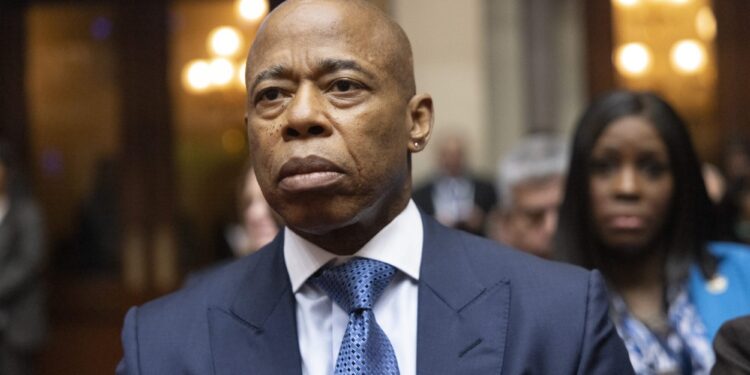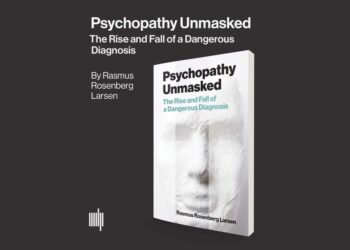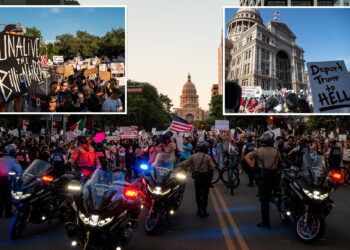
In the last 50 years, New York has had just two mayors booted from office after a single term.
Abe Beame and David Dinkins were loyal Democrats who spent years climbing the party ladder before getting to the top.
But the City Hall hot seat proved to be too hot, and voters turned them out after each had served four turbulent years.
The troubles they encountered were distinct to their personalities and tenures, but the men shared a common malady.
Both appeared to be overmatched by the enormous demands of the job.
Although history has largely defined their failures around single key issues — the 1975 fiscal crisis in Beame’s case and the early ’90s violent crime epidemic in Dinkins’ — the overriding impression was that the job was too big for them and that the city was spinning out of control.
Which brings us to Eric Adams.
Midway through his term, Gotham’s 110th mayor has hit the wall. He is swamped with problems and seems to have few allies and fewer ideas about how to get a handle on the mushrooming crises.
His administration always appears to be behind the curve, with the recent surge of pro-Hamas rallies shutting down roads and public spaces before police can react.
Underwater approval
Law-abiding citizens get punished by ineffectiveness, leading to questions about whether the city is governable. In fact, it is governable, as Ed Koch, Rudy Giuliani and Mike Bloomberg resoundingly proved at different times.
But ask the question today and many New Yorkers would say no, it’s not governable. What they really mean is that it’s not governable the way Adams is trying to do it.
A December poll underscored the point. Adams’ approval rating was at a disastrous 28%, the lowest Quinnipiac University has recorded in its 27 years of surveying New Yorkers about their chief executives.
Echoes of Beame and Dinkins ring loudly in that the doubts about Adams range across the board. On his handling of crime, schools, the surge of migrants, homelessness and the budget, his approval numbers averaged 27%, while the disapprovals averaged 63%.
There are also major concerns about what Quinnipiac calls his “personal traits.”
Some 55% of those questioned said Adams does not have strong leadership qualities, 56% said he does not understand their problems and 54% said he is not honest or trustworthy.
And the good news? There wasn’t much, with just 35% of Democrats approving of his mayoralty.
Only black respondents gave a thumbs up, 48%-38%.
The chance that even worse news is coming is heightened by reports that Adams has told associates he expects to be indicted, perhaps this month. The case being pursued by federal prosecutors centers on questions of whether he conspired with the Turkish government to make illegal contributions to his 2021 campaign.
At least two fundraising aides were the subject of search warrants and, in an extraordinary move last November, FBI agents stopped the mayor on a Manhattan street, told his security detail to step aside and seized his electronic devices.
Apart from the criminal probe, a common factor in Adams’ peril is the surge of illegal border crossers who arrived in the city. The consequences show up in the budget crisis, homelessness, public disorder and increasingly crime.
As I have noted, Adams is responsible for exacerbating the problem in the first place. His declaration that New York is a sanctuary city was more than a statement of fact.
It was a boast meant to display his bona fides among the leftists who advocate for open borders, and one result was that the city became the go-to destination of thousands crossing from Mexico.
The latest count is that more than 125,000 are here, with nearly 65,000 living at taxpayers’ compulsory largesse.
Crisis of his own making
Yet numbers alone don’t capture how the mayor botched the situation. When he realized the city couldn’t handle the thousands arriving weekly, Adams blamed the white Republican governor of Texas by playing the race card.
But while he demanded federal and state financial help, he never demanded that President Biden close the border.
That’s the one thing that could have helped immediately and made a long-term difference, but Adams couldn’t go there. Either out of party loyalty, fear of political blowback or sheer incompetence, he never made the obvious connection between the city’s problem and Biden’s policies.
Successful mayors, regardless of political affiliations, would have been so insistent that the White House couldn’t ignore them.
How in the world did Adams not realize the problem would continue to grow faster than any solution as long as the border was open? That the question remains unanswered 18 months after Adams first noticed migrants were living in city shelters speaks to a dispiriting emptiness at the heart of his mayoralty.
Other than banging the tin cup, his one substantive move was a demand that Gov. Hochul force suburban and upstate cities to take some new arrivals.
They said no and Hochul backed them up, realizing her career would be kaput because no other official wanted to repeat the city’s experience.
Assuming he doesn’t face criminal charges, Adams’ main political strength is that his likely opponents in a 2025 Democratic primary are lefties who would be considered fringe radicals in any other time and place.
He was elected on an anti-crime platform and has made meaningful progress in reducing shootings and murder, though overall crime continues to climb. Ominously, the thin blue line is growing thinner because of budget cuts driven by the exorbitant migrant cost.
But his rivals are far less interested in law and order. Comptroller Brad Lander claims “Immigrants benefit our economy, irrespective of their status” on an office web page that insists “Undocumented immigrants support economic growth, pay taxes, and keep our city and economy running as essential workers.”
In fact, most illegal immigrants are not permitted to work, but the effect of Lander’s argument would be to erase many distinctions between legal and illegal arrivals.
Other hypocrites
Another likely opponent, Public Advocate Jumaane Williams, is a perpetual candidate for higher office and a frequent critic of cops even as he lives safely on a Brooklyn Army base. His job is so inconsequential that it should be eliminated.
Former Gov. Andrew Cuomo also is eyeing City Hall, but has said he would not challenge Adams in a primary. Cuomo’s disgraced departure from Albany is an obvious hindrance to a comeback, especially if he fails to show any remorse over his deadly nursing home order and the multiple sexual harassment claims that drove him from office.
Still, Adams should take no comfort from the weakness of rivals. If he is indicted, he’s probably toast.
Even if he escapes charges, he still needs to show he’s up to the job. A major reset is essential if he hopes to avoid the one-term club of failure.



























